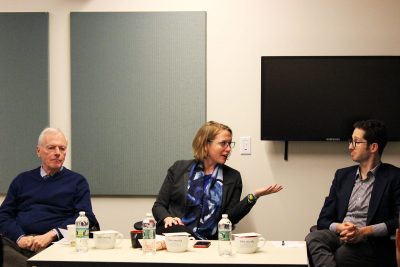
Global attention turned to Latin and South American politics following Brazil’s October elections which resulted in the appointment of far-right President-Elect Jair Bolsonaro. As experts analyzed how Bolsonaro would influence international politics, the Boston University International Affairs Association organized a panel Wednesday to explore the history of U.S.-Latin American policies.
The panel, entitled “US Intervention in Latin America- Aiding or Debilitating?” was held by the BUIAA in conjunction with the Office of Student Programs and Leadership as part of the “Professor Perspectives” series.
Initiated by the Office of Student Programs and Leadership, “Professor Perspectives” holds panels a couple times a semester that feature professors on campus and offer students “candid conversations” outside of classrooms, according to Kirstin Buchanan, a senior in the Pardee School of Global Studies who works in the Office of Student Programs and Leadership.
International relations professor Joe Wippl and assistant professors Julie Klinger and Joshua Shifrinson participated in the panel discussion.
Wippl, a former CIA officer, began the panel by mapping out the historical context of the relationship between the United States and Latin American countries’ intelligence in the 20th century. He summarized the United States’ interaction with Latin America after World War II in three phases: the Cold War, the “Central America show” (when many countries in Central America underwent revolutions and democratization) and the “we don’t care” phase.
After the panel, Wippl added that the United States’ attention toward Latin American countries has become “purely commercial.” When he stayed in Guatemala and Mexico City, Mexico, in the 1980s, he said he saw that most of the Latin American societies were a “democracy without the rule of law.”
Shifrinson said he thought the different phases Wippl laid out unfolded as a result of “great power politics in global unit reverberating in Latin America, as in the Cold War era,” as well as an extension of U.S. domestic politics. As an example, Shifrinson listed the war on drugs in the 1980s.
He addressed whether China should be seen as the rising competitor of the United States in light of Chinese investments in Latin America soaring in recent years.
“If we believed China is involved in Latin America, A: to what extent does this require America to be involved?” Shifrinson said during the panel. “B: what is the most efficacious way of doing this? Does it require covert action? Does it require a hands-off approach?”
After examining the responses and consequences to U.S. intervention in Latin America, Klinger said United States and Latin American politics are inseparable. Once the professors concluded with their speeches, students asked them about tensions on Latin American investments and the recent rise of Bolsonaro.
Jonathan Gurewich, vice president of the BUIAA and a senior in Pardee, planned the event with Buchanan. Gurewich and Buchanan said they feel the media don’t talk much about Latin America.
“People don’t know [this], but a lot of the sentiment in Latin America is anti-U.S.,” Buchanan said in an interview. “That’s not really talked about much or even really explored to why it’s anti-U.S.”
Ana Paula Rodriguez, a junior in Pardee from Mexico, said she was eager to look into the implications of recent political changes, including the new North American Free Trade Agreement (NAFTA) deal and Brazil’s president-elect. She said her biggest concern is the immigration crisis, in which she hopes for more respect and collaboration from both sides.
Rodriguez said she saw the panel as a good opportunity for people to learn about the importance of Latin American countries in U.S. politics. Knowing most of the Latin American countries are developing countries, she said she hoped for more help from the United States.
“U.S. economic intervention could be really beneficial for them, respecting, obviously, the rule of law,” Rodriguez said.
Wippl said he hoped his students, when discussing these topics, would always remember to know the facts.
“We all have our beliefs, but you also have to step back and look at the facts and let the facts lead you to a conclusion,” Wippl said in an interview. “That is a problem in America now — this whole idea that the fact is anything I believe, well, that’s not true.”



























































































































